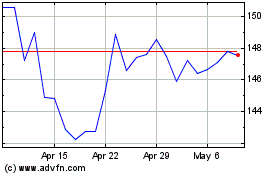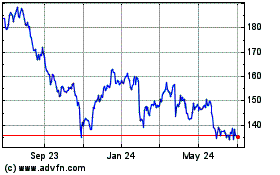UPS Plans to Ramp Up Spending After Struggles With Holiday Season Delays -- Update
February 01 2018 - 12:25PM
Dow Jones News
By Paul Ziobro
United Parcel Service Inc. will spend up to $7 billion this year
to upgrade its delivery network, adding jumbo jets and automating
facilities, as it tries to fix service issues that hurt profits
during its latest quarter.
The network came under pressure during the past holiday season,
as UPS delivered 762 million packages during the peak period, more
than its initial forecast of 750 million. The company said Thursday
it incurred an extra $125 million in costs as it scrambled to lease
planes and trucks to handle the extra volume and clear backlogs
that hit the network during the week after Thanksgiving.
The added costs caused UPS operating profit to fall 5.5% in its
large domestic segment during the fourth quarter, even as the extra
business and higher prices boosted revenue 8.4%. Overall for the
period, UPS operating profit, excluding a pension accounting
charge, rose 3.2% while revenue surged 11% to $18.83 billion.
UPS did try a new pricing strategy during the period, hitting
shippers with additional surcharges for residential deliveries
during the busiest shipping weeks. UPS said the extra fees, which
also applied to oversize packages, helped increase revenue and
shifted some deliveries to less congested weeks, but not enough to
avoid problems early on.
"We didn't have quite the success that we thought we would in
shaping [demand] and we're going to look into that," Chief
Executive David Abney said Thursday on the earnings call.
In an interview, Mr. Abney said UPS's volume in the week after
Thanksgiving rose 20% compared with the prior year, much more than
the 9% increase it expected. UPS also had to cap its volume on
certain days, adding to shipping times.
UPS needs to work closer with its shippers to anticipate the
higher demand, which was widespread among shippers of all sizes, he
said. "It's not just the big ones you can think of. It was the
small ones, the medium ones and the big ones," Mr. Abney said.
FedEx Corp., which devotes a smaller portion of its business to
home deliveries, didn't appear to suffer similar setbacks during
the holidays. In a research note Thursday, Citi analysts said FedEx
didn't incur "meaningful disruptions" during the holiday period and
also seemed to avoid "elevated costs." A FedEx spokesman declined
to comment.
UPS's capital spending plans this year are a significant step up
from 2017, when the company spent $5.2 billion on capital projects.
Executives said that benefits from the new corporate tax law as
well as plans for increasing demand caused the company to move up
its spending budgets.
The added spending, however, worried investors, as the company's
recent upgrades to its network haven't been able to keep up with
demand and margins have decreased. In recent trading, UPS shares
fell almost 6% to $120.05.
The outlays include automating more parts of its network. UPS
plans to build or retrofit 18 facilities, including three new major
ground hubs in the U.S., the first such facilities its added in two
decades. Most of the extra capacity will be built in parts of its
network that suffered bottlenecks during the holiday period.
Mr. Abney said UPS is now able to accelerate automation projects
because the technology needed to retrofit existing facilities is
more compact. Previously, adding the equipment could eat up to a
third of a 30,000-square-foot buildings space. But now, UPS can
make the upgrades without sacrificing the footprint.
UPS will also expand Saturday delivery, which they began last
year, to more markets.
The company said Thursday it also plans to buy another 14 747-8
aircraft, exercising options for the freighter version of the jumbo
jet granted when it made a firm order for 14 of the Boeing Co.
planes last September. UPS is also adding four new 767-300Fs to the
59 it already operates. The company operates more than 500 aircraft
that it owns or leases.
The Atlanta-based company also said it made a $5 billion
contribution to its pension plan last year, seeking to bolster the
plan and optimize tax benefits under the new law.
For the fourth quarter, UPS reported a profit of $1.1 billion,
or $1.27 a share, compared with a loss of $239 million, or 27 cents
a share, a year earlier. The prior-year quarter was hurt by a $1.90
per share pension-related charge while the current quarter results
were boosted by 30 cents due to the tax overhaul.
The courier also said it expected 2018 adjusted per-share
earnings of $7.03 to $7.37. Analysts polled by Thomson Reuters had
forecast annual profit of $7.16 per share.
Imani Moise contributed to this article
Write to Paul Ziobro at Paul.Ziobro@wsj.com
(END) Dow Jones Newswires
February 01, 2018 12:10 ET (17:10 GMT)
Copyright (c) 2018 Dow Jones & Company, Inc.
United Parcel Service (NYSE:UPS)
Historical Stock Chart
From Mar 2024 to Apr 2024

United Parcel Service (NYSE:UPS)
Historical Stock Chart
From Apr 2023 to Apr 2024
